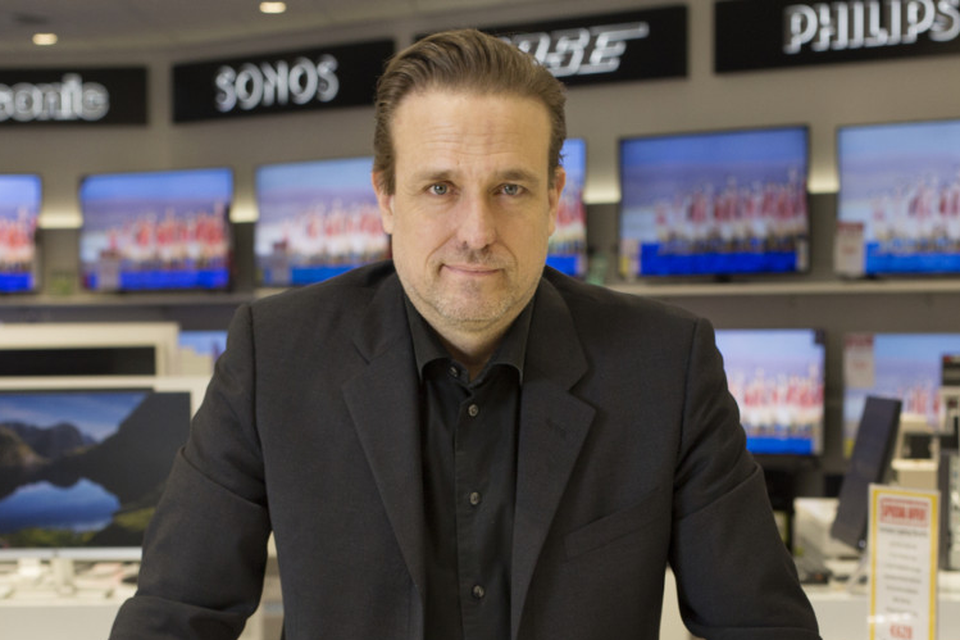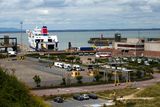'Bad stores kill retail - not Amazon'
We're all getting it wrong about Amazon killing stores in Ireland, Harvey Norman boss Blaine Callard tells Adrian Weckler
Harvey Norman CEO Blaine Callard inside the flagship store in Tallaght. Photo: Tony Gavin
Blaine Callard is wound up and ready to pounce. "I'm giving you facts and you're giving me back sentiment," he says, waving a dossier at me. We're sitting in Harvey Norman's new flagship outlet in Ireland, a giant, 58,000ft Ikea-like retail superstore in Tallaght. Surrounded by 65-inch TVs and custom sofas, Callard is giving me chapter and verse on a topic that bugs him: why internet shopping is not killing physical retail. We in the media keep perpetuating this line. Worse, we wrongly attribute retail's demise to a single player- Amazon.
This is baloney, he says, a yarn being pushed "by men in technology companies who don't like shopping in the first place". This includes me, he adds. "I've read articles you've written on this and you're wrong," he says, spreadsheets and clippings fanned out on the table.
"You're a technologist. You're not typical. What you do is to buy things. But there's a difference between buying things and shopping."
To support this, Callard has a range of facts and figures showing that visits to physical stores are actually up, not down. That in the US, there are more shops opening now than ever. That Amazon has only actually reached 5pc of retail.
Hold on, I say. What about the decay of the high street? Zombie shopping centres? Are these figments of our imagination?
A misreading of the data, he says. High streets are struggling because of parking charges, bad zoning and inappropriate shop sizes. Shopping centres, if they're struggling, can blame their "pretty low" standard. And none of us are talking about the great recession of a decade ago, he says, which is still affecting these traditional retailing zones far more than is properly credited.
Callard is right about one thing: like the "men in technology companies" he refers to, I've definitely been swayed by some of the data indicating a migration from offline to online shopping.
So when PricewaterhouseCoopers recently claimed that two-thirds of Irish consumers have shopped on Amazon and that one in five of us shop less often at other retail stores as a result of Amazon, I took it as a serious signal.
And countless other reports, from the testimony of people like British retailer Mike Ashley saying the British high street is "already dead" to industry statistics that suggest ecommerce is starting to eat into physical retail, have also made it into these business pages.
Callard rolls his eyes. Lots of that is misinformed, he says. "The reason that some stores are failing isn't because of Amazon, it's because they're bad stores." Clerys is an example, he says.
"If you ever went into Clerys before it closed, it was where retail went to die.
"Just look at those stores, they're tired, they're dusty," he says. "You think: 'This is where my grandparents would go to shop'." Shopping centres don't help, he says.
"The standard is pretty low. I'll be honest, the one close to me is where retail goes to die."
So to recap: it's not Amazon and it's not the internet. It's mismanagement, bad retailing and a host of other factors.
Callard has a reason to be passionate on this subject. His company, which has 15 stores in Ireland taking in over €200m in annual revenue, has just invested close to €10m in the massive new Tallaght superstore. It's a big bet.
The gigantic structure stands on its own off Tallaght's Greenhills Road. There really isn't anywhere else for shoppers to go, bar a small Costa cafe. So for it to work, this has be a destination in itself, a day out for families and shoppers.
And that's exactly what it will be, Callard says.
"Shopping is a recreational, social activity. Going to a store is exploratory, tactile and physical. I can take the kids. It's a totally different thing to just buying something."
Do people like physical shopping enough to sustain retail stores? Is it something to look forward to, like a movie or a meal? Even if not, is it a passably pleasant way to spend the time, something you're fairly happy to do? Or is it something to endure? In Ireland, one might characterise this as 'the Ikea challenge'. Because there are two very different responses to the question 'What do you say we spend the morning in Ikea?'
But if you're one of the people who loves the idea of wandering through a store with lots of different things, as Callard believes many of us will always want to do, the new flagship Harvey Norman Tallaght store will probably do it for you.
Dwarfing the company's other 14 stores, this one has what appears to be the largest concentration of tech gadgets and electrical appliances in a single physical store, with an even bigger area given over to furniture and houseware stuff.
The reason it's so big is exactly because people prefer to physically browse, examine and touch things they might be interested in buying, he says.
"Most people don't know enough about a product to necessarily zoom in and just get it online, sitting in their lounge chair," he says. "They want to go in, they want to pick it up, they want to feel it."
But if this is true, why are clothes the biggest growth category in online shopping? Virtually all surveys show that clothes are now the most-purchased item online among ordinary people. By Callard's logic, shouldn't they want to look at and feel them before buying? "The economics there don't stack up," he says. "Returns are extraordinarily expensive and rocketing. Research in the US shows that 30pc of all products bought online last year were returned, compared to 9pc in bricks and mortar stores. It's the same in the UK. Most of those clothing returns end up in the solid waste stream because the returns can't be resolved."
This, Callard says, undermines another hoary old trope that people like tech journalists throw about: that internet shopping is a low-cost model.
"The narrative is always this very simple one, that ecommerce is a low-cost model and that physical retail is a high-cost model. That whereas we pay rent and staff which is all really expensive, ecommerce is light touch with low rent, no shop and no staff and therefore it's going to disrupt retail because it's going to always be cheaper prices than stores. But we're now 10 years down the line and it has been completely debunked that ecommerce is a low-cost model. It's not just the cost of returns, which is horrendous. There's the cost of customer acquisition, which is huge for most of these ecommerce players. Amazon sank €10bn last year into delivery costs."
Callard says that one reason online retailers get into the business, thinking it will be a low-cost one, is the belief that an efficient online operation would look like Amazon. But he argues that industry rivals are only now fully realising that Amazon's low prices are really just cross-subsidisation from other, profitable Amazon services such its cloud and hosted storage businesses.
"Amazon has not made money selling stuff," he says. "It doesn't make money in any market other than the US. And in the US it's primarily making money out of its non-retail activities. Its high share price is an expectation of what's going to happen tomorrow, that some apocalypse will happen and that other retailers will die and that it can suddenly put up its prices and be profitable. But that's not going to happen."
There is a host of retail, financial and online industry researchers that would take issue with this analysis. Given its share price and position as the world's most valuable listed company, the financial markets certainly don't see Amazon's retail operations as having plateaued in the way Callard suggests.
But Harvey Norman's Irish CEO has a strong voice in Irish retail for good reason.
The Australian-born chain of stores fought its way back from a heavily loss-making state to profitability in the last three years. It has had to find out the hard way how to survive as a retailer in an open competitive economy that has run the gamut on financial and infrastructural challenges.
In Ireland, it's the top seller in many of the product categories it lists. (In furniture, it's still number two to Ikea, despite the Swedish giant only having a single store in Ballymun.)
Callard himself also has more than just a few years running sales floors under his belt.
He counts an MBA from Trinity College alongside Australian and French degrees in law, arts and corporate finance.
He has seen the industry from other angles, having founded a wholesaler of Japanese furniture during his time running Harvey Norman's European business in Ljubljana. It may be this mix of experience that gives him more confidence in challenging the prevailing wisdom on what's driving - or dragging down - the retail business.
"If you take the global financial crisis of 2008 and 2009, that took a really, really long time to unwind," he says. "The UK have been extremely challenged for some time, with headwinds there that aren't necessarily digital. But when you look at Ireland, you see different things.
"Certainly, I drive through rural towns and I see main streets that are suffering enormously. Many of them are close to death. But there are a lot of structural reasons why that's happening. One large out-of-town consolidated grocery store may have taken away from the independent food stores there indefinitely. With other shops, you're simply wondering why they're there any more.
"And then in many of those regional towns, the councils are charging for parking. How does that support the local retailer? It's really unattractive and something the councils need to address."
Physical shops will always be a feature of our lives, Callard insists. But they'll chop and change as our tastes change.
"Look, digital is disrupting retail and retail has a new high bar to jump over," he says. "So stores will have to have remarkable store experiences. They will have to have the inventory and the service. That has to be a reason for people to go to a shop. If there's not then people will sit at home and buy online or they'll go somewhere else. And that retailer will die. But the two activities are not mutually exclusive. If you shop on Amazon, it doesn't mean you don't shop anywhere else."
Join the Irish Independent WhatsApp channel
Stay up to date with all the latest news















